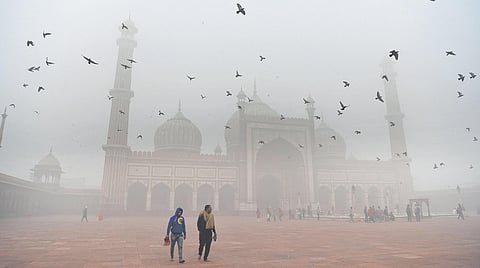

NEW DELHI: Battered by heatwaves and high Particulate Matter (PM) concentration, Delhi-NCR emerged as a major pollution hotspot in North India this summer, a time of the year, which usually does not see high pollution levels, said a Centre for Science and Environment (CSE) report on Wednesday which was based on a nationwide assessment of summer pollution.
Summer this year was not only unusually hot but also uncharacteristically high on particulate pollution, especially in North India. High PM 2.5 levels were observed not just in megacities but in smaller towns and cities as well, said the report.
According to the report, North India was the most polluted with Delhi -NCR being the hotspot. Within the NCR, Bhiwadi in Rajasthan reported the highest PM 2.5 average of 134 µg/m³.
This was followed by Manesar (119 µg/m³), Ghaziabad (101 µg/m³), Delhi (97 µg/m³), Gurugram (94 µg/m³) and Noida (80 µg/m³), the report states.
“The PM2.5 average of NCR region is almost three times the average of the cities in southern India,” it said.
The findings have emerged from the analysis of summer air quality undertaken as part of the air quality tracker initiative of the Urban Lab at CSE.
However, daily peak pollution levels were found to be the highest in east India 168ug/m3, with cities of Bihar recording the highest levels.
North India with 142 µg/m³ summer peak was the second worst in the country.
Avikal Somvanshi, senior programme manager at the Urban Lab, said that the average pollution this summer is higher than the previous summer.
North India has recorded a staggering 23% increase in seasonal PM2.5 levels compared to the previous summer based on an average of cities that have valid daily PM2.5 concentration data of both summers (1 March to 31 May).
“Within the region, NCR was the worst performing sub-region with 25.8% increase in seasonal PM2.5 level. Central India registered an increase of 15.6% while West India (4.2%) and East India (1.8%) registered increase under 5%,” it said.
High summer pollution is a result of a combination of pollution from vehicles, industry, power plants, waste burning, and dust sources and wind-blown dust, aggravated by heat and arid conditions.
Anumita Roychowdhury, executive director of CSE, said, “Due to heat conditions and growing desertification, summer months usually see high dust impacts. The dust is also a carrier of toxic substances from combustion sources including vehicles, industry, power plants etc. This requires significant tightening of action to control emissions from each pollution source as well as massive efforts to combat desertification, improve soil stabilisation, green-walling through afforestation, and reduce the heat island effect in cities,” she said.